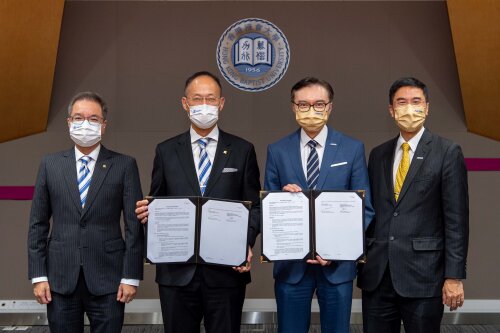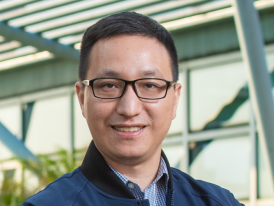
HKBU partnering with ASTRI to explore cutting-edge technologies and propel technology transfer

Hong Kong Baptist University (HKBU) and the Hong Kong Applied Science and Technology Research Institute (ASTRI) signed a Memorandum of Understanding (MoU) on “Fostering University Cooperation in Technology Transfer” on 22 September to jointly create a new era of smart living and cross-disciplinary technological development. The extended cooperation covers the areas of smart traditional Chinese medicine (TCM) service system, pharmaceutical research and development (R&D), art tech, fintech, as well as interdisciplinary research and its application, so as to promote technology innovation and transfer. HKBU and its affiliated institutions will jointly develop with ASTRI a number of cooperation models for R&D, including cutting-edge technologies such as artificial intelligence (AI) and big data analysis, as well as intellectual property management and commercialisation.
Witnessed by Professor Alexander Wai, President and Vice-Chancellor of HKBU, and Ir Sunny Lee, Chairman of the ASTRI Board of Directors, the MoU was signed by Professor Terence Lau, Interim Chief Innovation Officer of HKBU, and Dr Denis Yip, Chief Executive Officer of ASTRI on behalf of both parties on the campus of HKBU. Under the agreement, HKBU and ASTRI will enhance collaborative research and promote the transfer and commercialisation of technology results. They will also stipulate their respective intellectual property rights and ownership of R&D results, so as to promote the commercialisation of collaborative R&D or projects implemented by both parties or affiliated institutions of HKBU. In addition, the partnership aims to reduce the R&D time, improve the utilisation of resources and accelerate the application of R&D results.
Professor Alexander Wai, President and Vice-Chancellor of HKBU, said: ”Transfer of research outcomes is the third mission of universities. HKBU has identified three focused research areas including Creative Media and Practice, Health and Drug Discovery, and Data Analytics and Artificial Intelligence. The University has also established six interdisciplinary research laboratories to allow all faculties and departments to fully unleash their areas of excellence, stimulate intellectual interaction on common topics, explore and discover new cutting-edge technologies, and provide solutions to cope with challenges in society. The collaboration between HKBU and ASTRI provides ample opportunities for knowledge transfer of these technologies. I hope that both parties can continue to cooperate in different areas, such as art tech, smart traditional Chinese medicine and smart society.”
Ir Sunny Lee, Chairman of the ASTRI Board of Directors said: “Nearly 100 R&D projects are conducted every year in ASTRI with an ultimate goal of realising commercialisation. University is our significantly important I&T partner, and we proactively partner with HKBU to build an R&D commercialisation platform, promote mutual cooperation in an all-round way, enhance synergy in talents, resources, R&D, etc. Leveraging on perspective advantages, together we can create unique R&D conditions in key areas such as pharmaceutical R&D, AI and fintech, so as to seize the new opportunities in the I&T era.”
HKBU and ASTRI will cooperate on a project basis to deepen their mutual vision of technology exchange and development. This includes the determination of the contribution of each stakeholder in the development of R&D results, as well as the ownership, funding arrangements, project implementation responsibilities and intellectual property protection of R&D results of relevant joint projects. This will enable both partners to explore opportunities for technology commercialisation with the intellectual property owned by both parties. It will also ensure that local R&D can be effectively turned into applied technologies and enlarge the production capacity.
Previous News
Next News



